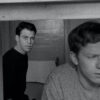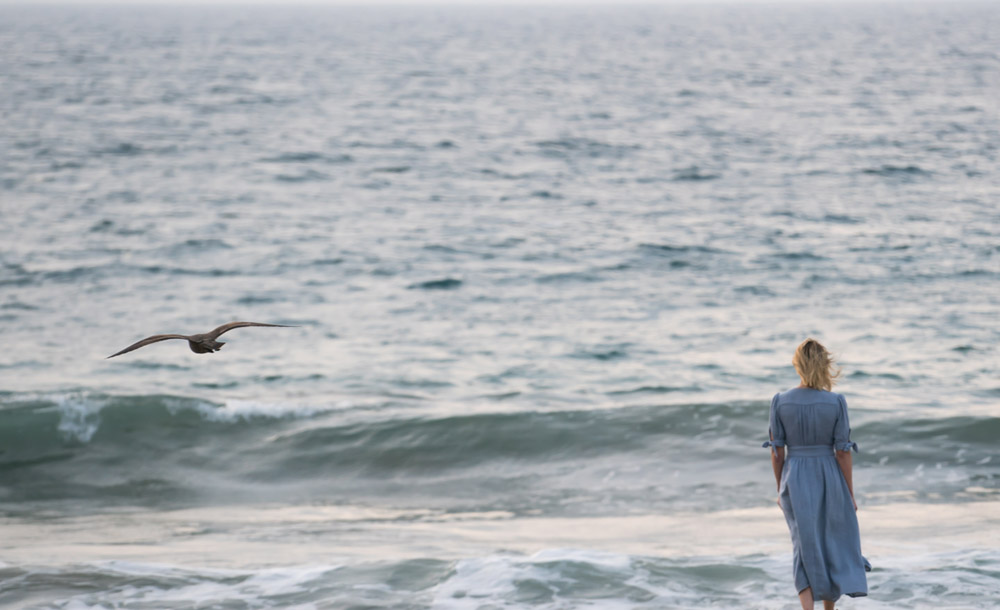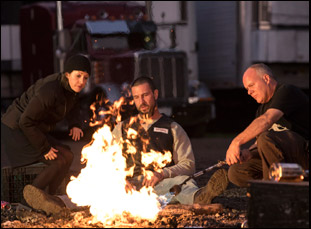For her AFI Thesis film “113 Degrees,” Sabrina Doyle could’ve set her romance in an apartment and with some canny production design and trick photography called it space. It just wasn’t in her temperament to do that.
“We built a spaceship set and we did zero gravity and put actors on wires and it was a 20-minute short, so it was very ambitious,” recalls Doyle. “I’m not one of those filmmakers that works within their limits. I probably should be, but I’m not.”
On paper, Doyle’s feature debut “Lorelei” would seem to be more modest by comparison, a quiet drama set in the Pacific Northwest telling of high school sweethearts Dolores (Jena Malone) and Wayland (Pablo Schreiber) who reconnect after the latter serves a 15-year prison stretch. However, rather than show ambition by going bigger, it comes out in how the writer/director is able to go deeper, following the biker gang member home to find that his reacclimation to civilian life will be more challenging when Dolores has had three children — Peri (Amelia Borgerding), Denim (Parker Pascoe-Sheppard) and Dodger (Chancellor Perry) — in his absence, all by men who shirked any paternal responsibility.
Doyle impressively engineered a 25-day shoot that encompassed shoots in Portland, Los Angeles and Sacramento on a limited budget, but it’s the ground she covers emotionally that’s most impressive, delving into the complications of a couple that have been able to unpause their relationship, but remain stunted in different ways by the time they spent apart with Wayland coming to enjoy the responsibility of being a parent while knowing he’ll never likely have any of his own as long as he’s with Dolores, and Dolores grappling with restarting their romance when she’s already put so many of her own personal goals on hold. There’s a bone-deep authenticity to what unfolds in front of the cameras with an easy, lived-in chemistry between all the actors and the way in which resentment and regret can live side-by-side with plowing ahead, but Doyle also allows for real joy to emerge as Dolores and Wayland make the best of their circumstances for each other and for the kids, accented throughout with subtle, shrewd stylistic choices that constantly let the sun break through the clouds in Oregon.
Although it’s a responsibility she should’ve never had to bear, Doyle now strangely finds herself in a similar position to her central characters trying to do right by her film family and keeping spirits high after “Lorelei”’s planned premiere at Tribeca was cancelled due to the coronavirus, leaving one of the year’s most exquisite films to largely go unseen. That changes this week with its first public unveiling at the Deauville Film Festival where the film’s cast and crew will be unable to attend, yet Doyle generously took the time to talk about how she made such an affecting drama, how her personal history informed addressing inequities of class so beautifully and creating an environment in which the cast could be comfortable taking the story to the sometimes difficult places it needed to go.
Rather strangely, actually. [laughs] I was put in touch with Arnold Zimmerman, the person who ended up being our executive producer/financier. He’s a retired businessman and he had raised in his life, four children that were not his biological children. They were his wife’s children before she met him, and he says it’s the hardest and yet most rewarding thing he’s ever done, taking on these four children and raising them, and he felt that he hadn’t seen that kind of male character on screen before. So that was his idea, which was very preliminary, but he was really passionate about it and was willing to put up the money to make a film with that character. We met and we really connected, and everything else he left up to me, but that was the germ of the idea, so I was like, “How can I make this my own?”
I was not raised by a stepfather, but I got to thinking a lot around the themes of not getting things right the first time around and really being able to make the most of your second, third, fourth, fifth chance and invest in the future instead of the past. That felt important because there’s an idolization of youth and early success in our culture, especially as filmmakers when you have a film at Tribeca and a film at Deauville or whatever, but the failures are many, many more than the successes, so I wanted to make a film that is kind and honest about that, and talks about the ability to turn regret around really, and I thought that was especially important in the climate that we’re in. This isn’t an overtly political film, and I should talk about my home country more because I’m British, but I do think that there’s a toxic nostalgia in the UK that’s seeping through where people think the past was better than the present. I think that’s where Brexit has come from — this nostalgic desire to go back to when we were great, this idea that change is bad, so I wanted to interrogate that. There is a nostalgia for the past in the film, but I think ultimately the film lands in a place where it is really is about stepping in the river of change and being swept along by it.
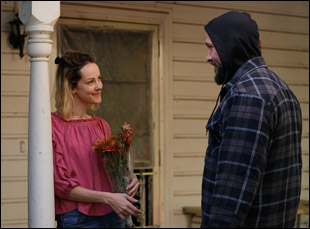
The brief, if you will, was to make a film about a father, but so often in these types of films, you get this female character displaying less complexity than the male character. She’s often the moral conscience of the male character, and I wanted to turn that on its head and have a female character that was both good and bad and does some things that people don’t like because I feel that those are the characters I’m interested in in movies. I feel that complexity is a luxury afforded to certain white male heroes, and it felt dramatic to me to have one character whose life has forestalled and then another character whose life has evolved beyond him, yet they’re both kind of fixated on who they were when they were 18. And that’s an age when your choices aren’t quite set in stone yet.
It’s interesting you picked up on that because in my look book for the film, I talked about visual prison motifs, enclosing the characters within vertical bars in the frame, seeing the characters in doorways or through fencing, and then I talked about how gradually in the second act, as Wayland becomes freer, we see Dolores more in that type of framing. She’s been in a prison of her own as well [because] motherhood is difficult, right? As a society we fetishize motherhood, but we don’t necessarily see the sacrifices that mothers make or just how difficult it is financially, physically, emotionally to be raising this family on not very much money. And that was important for me [because] another trend I see in cinema is to show poor people’s lives in a way that accentuates their misery, really almost to the point where you’re at a zoo and these poor people are like exotic animals, and the more misery as a filmmaker you can put those characters through, the better.
I didn’t want to make that film. I wanted to make a film about hard up people because I’m from a working class background myself. I was a first-generation college student. My dad left school at 14 and worked at a factory and then became a construction worker and my mother didn’t finish high school either, so we were not well off growing up, and one of my favorite bits in the film is the birthday party. It felt really resonant to me because I know what pressure my mother was under at Christmas and birthdays with limited money to create a nice experience for us, and I think it confounds people a little bit because when you do make a film that’s set in this kind of milieu of blue collar America, people have certain expectations of what that film will look like and I don’t think this necessarily meets those expectations. I wanted to show the scope of these people’s lives and their imaginations and their dreams and their hopes.
You’re describing all the reasons I love this movie – and this may speak directly to your point, but when I heard the premise and I heard Pacific Northwest, I thought this movie is going to be damp and dreary, but there’s so much color and so much life to it. What was it like figuring out the palette for it?
It was important to not have a washed out look, because again a lot of the tropes for these sorts of dramas is to have them be desaturated, so we drew our palette from the blues and greens of the Pacific Northwest, but also had the colors really pop and be really vibrant with jewel tones like magentas and pinks and reds that would offset the cool tones, especially [in scenes with] the kids. I’m glad we achieved that because it’s hard to do color control on an indie budget. Our amazing production designer [Marissa Leguizamon] did such a good job on such limited resources, and I don’t know how she did it, but she and the DP [Stephen Paar] in tandem really controlled our palette. And the the house that we shot the film in was abandoned and had been boarded up, so we were able to go in and dress it and turn it into a home and really make it feel lived in. To get that much junk inside a house, you’re going to every thrift store and front yard sale, picking up stuff left and right, and to do that on a budget and still maintain consistency over a look is nothing shy of a miracle.
And Oregon came up for practical reasons. It was very important for us to get a deep sense of place with this movie, and to do that on our kind of budget, we were scouting in Oregon for a good year before we were shooting the film. I’d literally drive around for hours, looking out the window trying to find cool places to shoot, and the proximity of Oregon to California made that possible. I had an obsession with the Pacific Northwest from “Twin Peaks,” which is my favorite TV show of all time — and there was also the feeling of wanting to shoot somewhere that could be like anywhere America almost, and there was a rural vibe about some of the Pacific Northwest that felt like visually it could fit and be a bit more universal. Also, I grew up with the rain from the UK, and I’m shocked I’m saying this because when I lived in the UK, I dreamt of the sunshine, which is part of what drew me to California, but I think when it’s sunny all day every day, you do have that, “Oh god, another day of sun,” so maybe there was a nostalgic longing on my part for the weather I grew up with.
I’ve always been obsessed with water, and this might be my childhood to some extent because I would spend my whole childhood in London, which is very bricked up and grey, dreaming of the ocean and every summer we would go visit my grandmother in Italy on the coast where I’d get to go and frolic in the waves. So I had this obsession with water and it felt to me like that could be a journey in the film with this leaky, drippy, wet Pacific Northwest [at the start]. Now the film didn’t fully turn out like that in the sense that we shot in the fall and we had better weather than we anticipated, so a lot of it is actually nice, bright sunny days, and I remember when we were shooting, the DP and I were so disappointed because it wasn’t the look that we imagined, but it works because we have a mix of sunny and cloudy days that I think actually turned out really well for the story in the end.
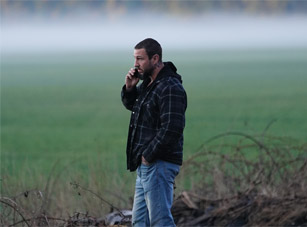
I like to really research things. I’m writing a medieval script right now and I’m really learning as much as I can about that world, to the point where I’m reading Chaucer. [laughs] Obviously, [“Lorelei”] takes place so far away from where I grew up, I was insecure about it because I wanted to get it right, and it was important to me to go up and spend time with the sorts of communities we would be depicting. We spent a lot of time making friends with motorcycle club members up in Oregon and that was a community that was hard to get into because they’re generally quite private, but we were very lucky and we certainly experienced a lot of kindness and generosity. We met someone who really helped us make friends in that community and all the bike stuff in the film was people coming out for us, just to support the film, and it all came via this one gatekeeper who was a really open, free-spirited person who thought it was cool that people wanted to come up to his neck of the woods and shoot a movie.
In terms of research, I also just wanted to speak to people who had been in prison in the Pacific Northwest, so we spoke to parole services in and around the Portland area and went to halfway houses, meeting people who were coming out of prison or had relatives in prison, and prisoner support groups. For example, the whistle that Denim blows in the kitchen, that story point came from a guy who works with parolees telling me that a lot of ex-prisoners have aural triggers, so they hear something they heard in prison and it can bring them back to a traumatic place, and as a filmmaker, you want to tell a story that’s universal, so you start with some quite broad strokes when you’re first writing a story, but then you go through and fill in the details and make it more and more specific. A lot of that specificity is drawn from real details that real people tell you.
It’s interesting how the journalistic training has been really helpful because being a journalist is about winning people’s trust very quickly and inserting yourself into communities where you’ve never had any sort of contact and getting them to talk to you and trust you. I worked at the BBC for six years where I would do a lot of this – I would get sent somewhere and by the next morning have to have found all these people and gotten them to open up, so I’m not scared of doing that. But when I was working in the news world, I had a hankering for the freedom of fiction, and at a time when the world is stranger than fiction, and I think films are becoming more and more aware of the political and social environment in which they are screened and shot and made, there seems to be a lovely coming together of my two worlds that’s happening right now [where] my work as a filmmaker has found its link to reality.
Of course, the family seems quite authentic, but it’s got to be an interesting situation when you want them to feel close, yet Wayland has to start at a place of estrangement. What was it like to get those relationships right?
It’s a number of things. The biggest stroke of luck besides finding the money to get this film made was getting Pablo and Jena cast. They’re both parents, and they both really took time to make friends with the kids. Jena was a former child actor, so she gets what that’s like, and they both talked to the kids a lot about the industry, and the younger ones are too young to think about a career in it just yet, but Chancellor, who plays Dodger, is very seriously thinking about a career and they were both generous with their time in terms of talking to him. Then we saw hundreds of kids, and I traveled around and I went to theater groups and I went to community theater and to school drama clubs, and we spent a lot of time looking for these kids, but in the end, we found two kids who are friends in real life and they were the best kids for the part — Parker who plays Denim is non binary like their character and their really good friend in real life is Amelia, who happens to play Peri.
They already had a brother/sister dynamic when I met them, like snarking at each other like brothers and sisters do, and that was just a stroke of luck. They were independently the best actors we auditioned for the part, but they already knew each other, so they had that in-built dynamic. And Chancellor came in and both the younger kids are kind of obsessed with him. They just look up to him and look forward to hanging out with him, and he really became the older brother for them in every sense. He was really caring and nurturing on set, especially with Parker who plays Denim; [that scene where] Parker crawls into Chancellor’s lap while they’re having a row in the kitchen, that was just spontaneous. They had that connection, so it felt natural in that moment to do that.
We’d meet in the weeks before we shot the film — we were able to make it happen because if we hadn’t done that, the thought of kids who have never acted before walking onto a film set on day one and being confronted with that was just unthinkable. So we got them to do little role plays as a family. For Peri, we were like, “What was Peri’s 10th birthday like? What happened on her last birthday before the birthday we see in the film?” And we’d do a little role play around that, and children just have the most incredible imaginations. As a filmmaker, it’s really incredibly humbling to work with children because they’re really honest. They intuitively understand emotional situations, and these kids were just so smart, we got really lucky. It wasn’t really acting. It was just being together as a family and becoming a character that’s not you, but feeling everything that character feels.
Amelia, who plays Peri, is an incredible actress, she just takes direction so easily, and she’ll 180 degree adjust with no difficulty whatsoever. But she found it really hard to curse, and you wouldn’t think it would be hard for her because in the movie she does it with such relish, but that’s what a good actress she is. So every time there were curse words, she’d get really upset and her mom and I would have to talk her into it. Amelia would be like, “I don’t want to call Jena that bad word.” And it’s like, “It’s not you, it’s Peri. And Peri’s not a bad person. It’s just she’s hurt and this is how she expresses herself when she’s hurt.” The parents were really important [because] when you cast kids, you also cast parents, and they’re really mini-psychologists for their kids. We lucked out with our parents so much; they know their children so well and they were so key to interpreting their emotions and moods, and they’re your allies on set.
Another scene that was really hard is the scene where Parker, who plays Denim, and Jena fight when she tries to force them to wear pants, and then Denim spits at Jena. Jena was just so passionate about getting that scene right, so she took Parker and said, “Okay, now you’re not going to hurt me, so you can kick harder than that, and I want you to actually spit at me. It’s fine.” She gave Parker permission, and if that scene works, it’s entirely down to Jena because she completely took the lead on it. Jena was just so generous and really helped draw that performance.
And then similarly when Dodger punches Wayland outside the dive bar, Pablo was so instrumental to that scene because the kids are naturally nice people, so they’re going to hold back, and if they’ve got a nasty scene, they’re going to tone it down. And even when Pablo wasn’t acting, when the camera was filming Dodger, he would give Chancellor what he needed to react, so he kept up the intensity of his performance off-screen so Dodger could keep up the intensity of his performance. Sometimes actors don’t do that because it’s so intense to do an emotional scene that when the camera is over your shoulder, you tone it down a little bit so you can have a bit of a break, but he didn’t. He kept up the intensity because he knew that would get Chancellor to where Chancellor needed to be, so just the generosity of my two leads in helping the kids in that way was so important.
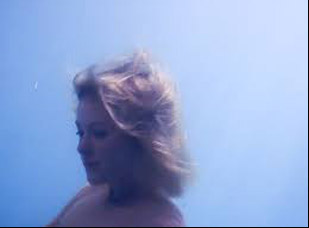
We did a Zoom party, yeah. Tribeca [not going forward] was such a disappointment. As a first-time filmmaker, you dream of getting into a festival like Tribeca, and it was so exciting, and I was disappointed for myself, of course, but I was also so disappointed for the kids because they were so looking forward to it. They haven’t seen the film yet because I want them to have the experience of seeing it with an audience, so I’m just waiting for that, but we played them clips. I asked them, “What do you want to see?” And they all wanted to see the end of the film, so I showed them the ending and one of the mothers cried, I think. It was so sweet. And it was so nice because during our Zoom premiere, we reprised a lot of like, “Remember this game that we played [on set]. Let’s play it again.” And they just loved that. At some point, it will be really lovely to get everybody in a theater. For actors that do it all the time, that’s one thing, but for people who have never done anything like this before, it’s an extraordinary experience and I think they keep wanting to return to it. They don’t have closure because we’re still in this weird situation where we haven’t screened the film yet…
That’s true for you as well, I’d imagine.
We’re excited for Deauville. It’s so thrilling that it’s going to screen in a cinema in front of an audience I remember when I started writing this film, it was around the time of the 2016 presidential election, so it’s a long, long journey to get a film made and out there, and then not having our launch happen [in the way we originally thought] is difficult.
I want this film to do well on its own terms, but it’d also be great if this film could help me make the next film. A lot of people say it’s even harder to get a second feature off the ground than the first, especially for women, and I know several women and also people of color in my position who thought this was their moment, either they had a film at South By or Tribeca. The traditional path is you premiere and you get a bit of attention, but a lot of people have now missed out on that exposure. It’s not anyone’s fault [because] who could’ve foreseen us being in this , but I would like the industry to step up and help those filmmakers who are in this situation because it’s hard for us, it really is. For us to have gotten to this point has taken enormous effort and to have the industry say, “Well, these filmmakers would’ve had this opportunity, so we’re going to collectively lift them up,” I would like the industry to do that for us, especially those who may be from less conventional film backgrounds and for whom it has been harder.
“Lorelei” will open in select theaters and be available on VOD on July 30th.
